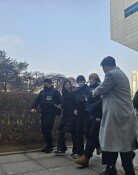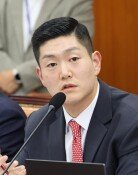In Last Term, Veteran Mayor Tells All
In Last Term, Veteran Mayor Tells All
Posted June. 21, 2006 08:48,
July 1 marks the beginning of the fourth local self-government.
A mayor of a provincial city, who is serving out the final term, which is the third since he came to serve for the local administration after the first-ever local government popular election, is telling a candid story of the merits and faults of local autonomy.
After winning a hectic campaign, you tend to tally up which towns and districts voted for you. I overlook the towns that did not give me many votes, even if it needs more budget for elderly community halls and roads. I depend on votes, but know that I misbehaved. I would like to take this opportunity to apologize to the townspeople.
Mayor Park Pal-yong (age 59) of Gimcheon City, Gyeongbuk Province, who is retiring by the end of this month after his third term, held no secrets as he looked back on his 11 years of service as mayor on June 15. After a two-hour interview, he said, It would take a couple days and nights to tell you all I kept to myself.
Some of the secrets he let out on was how he put emphasis on projects that would evoke the most immediate positive response from the residents, how he said that he would work on it and let time pass, although he knew some projects were impossible to carry out, and how he executed projects aimed at securing him a public nomination at the next elections.
He voiced his strong concerns on the problems of the local autonomy system of Korea.
Mayor Park received more than 130 awards, including Grand Prize for Local Self-government Administration issued by the Ministry of Government Administration and Home Affairs during his time in office. He basically received every single award given out to provincial governments.
He won campaigns as an unaffiliated in regions, where the Grand National Party enjoyed high popularity, by bringing a Korean Train Express station and the National Sports Festival to Gimcheon. He lost in party elections twice. He cited disagreement with an active assemblyman as the reason.
When it comes to money, he too had his faults. He confesses that his concerns apply to him as well.
During the monsoon or a typhoon, we would pretend to be working on construction, and knock the pillars of fragile old bridges with excavators at night. We receive recovery costs from the central government, when the bridge is swept away. We receive billions of won for recovery work on small bridges. We did everything to receive more budget from the central government.
He was disgraced many times as well. He had just returned from Seoul after a visit to acquire the city budget.
I visit Seoul 30 to 40 times a year to obtain the city budget. I usually plan on staying one night in Seoul, so I can work day and night there. I spend quarter of a year on begging for budget in Seoul. One time, I had to wait over an hour in a hall without a chair to meet a director of a bureau. It was a 1.5 billion won budget for roads. The director listened disdainfully for about 10 minutes, and told me to give him the papers and leave. I had to hold myself from protesting, I am here in behalf of 150 thousand residents! I could not tell anyone, because I felt so embarrassed. A city cannot even pay social servants their salaries without the budget from the central government, if it is not as rich as Seoul Metropolitan Government, he said.




![[속보] 3차 상법 개정안, 국회 본회의 통과](https://dimg.donga.com/c/138/175/90/1/wps/NEWS/IMAGE/2026/02/25/133421985.2.jpg)


